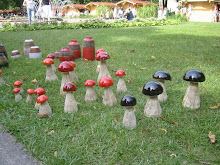Does capitalism in its current form still serve the common good of society? The global financial crisis has triggered intense debate, most recently in the Financial Times, about the future of capitalism, and whether capitalism -the driver of innovation - is overdue for innovation itself.
The answer to the call for “better capitalism” lies, in part, in a critical rethink of the role of business in society. Maximizing shareholder value is no longer the Holy Grail. Companies that perform best over time are purpose-led organisations that seek to build sustainable businesses in the interests of all stakeholders.
These companies make money but purpose, not profit, is their raison d'être. They advance productivity, improve the lives of people, address environmental issues, boost job satisfaction, manage a socially-responsible supply chain and so on.
Such companies do not necessarily have to be big. We see that at the Make a Difference forum held each January in Hong Kong. MaD runs an award scheme to identify and champion young change-makers who can bring about economic, social and environmental benefits to Asia an innovative and sustainable manner. Winners of the 2012 MaD Award amply demonstrate how small enterprises can change the world in a big way.
Take Marina Gana Vida (MGV), a company which runs a fish farming business in Mindanao, an area of the Philippines that has been plagued by widespread poverty and civil unrest caused by religious differences. By introducing an eco-friendly supply chain, from fish breeding, to making nets, storage, processing to distribution and marketing, MGV contributes to conserving marine resources and improving the livelihood of 2,500 Muslim households.
Founder Jonah Nobleza established MGV as a social enterprise unit of Strategic Development Corporation Asia in 2007 at the age of 30. "MGV is governed by three maxims," he said. "We believe in healthy food for consumers, vibrant and resilient coastal households as well as a happy earth." Armed with compassion, courage and business acumen, Jonah and his team aspire to develop MGV as the leading supplier of all natural marine products in the Philippines in the next ten years. As the Grand Award Winner of the 2012 Make a Difference Award, MGV will use its US$20,000 cash prize to set up a community feed mill to facilitate its shift to full organic fish farming.
Doing good and doing well is not confined to social enterprises. Arthur Huang, a university professor, engineer and architect, founded MINIWIZ S.E.D., LTD in 2006 at the age of 28.
“Producing less and buying less are the only solutions to sustainability. But how can we achieve this when business demands growth and consumers desire more?” Arthur saw this as the challenge and opportunity for Miniwiz. Synergizing expertise in design, engineering and manufacturing, his company delivers innovative, cost competitive and attractive solutions and products under its 3Rs mantra – Reduce, Reuse and Recycle.
Miniwiz’s most prominent project “EcoARK” was built for the 2010 Taipei International Expo using 1.5 million PET (plastic) bottles that were 100 per cent upcycled. It has also developed ground-breaking waste composites called POLLI-BER, made with recycled thermoplastics and agricultural waste. Miniwiz is now working with the Harvard Graduate School of Design to research into sustainable construction and materials with a specific focus on Asia.
Small organisations can also make a big impact by influencing large companies and leveraging their resources. Beijing-based Horizon Corporate Volunteer Consultancy, founded by Wang Zhong Ping in 2005, has assisted over 100 enterprises in China – including Fortune 500 companies - to run corporate volunteerism programmes by pairing charity organisations with corporate resources. The consultancy has worked with over 100,000 volunteers and 600 charitable organisations, benefiting more than 100,000 children, the elderly and the disabled.
Productivity growth backed by decades of conventional capitalism has resulted in cheaper consumer goods becoming more available while basic needs such as food, housing, healthcare, energy and education are becoming less affordable. Governments all over the world are facing the dual challenges of meeting these needs without landing themselves deeper in debt.
I believe today’s opportunities lie not so much in producing more, better and cheaper consumer goods, on the old capitalist model, but in businesses providing innovative and profitable solutions to meet the social and environmental needs in both developed and developing economies. As each year’s crop of MaD Award winners demonstrate, such businesses can succeed on their own or in partnership with governments and NGOs.
Subscribe to:
Post Comments (Atom)




Positive site, where did u come up with the information on this posting?
ReplyDeleteSEO Conference